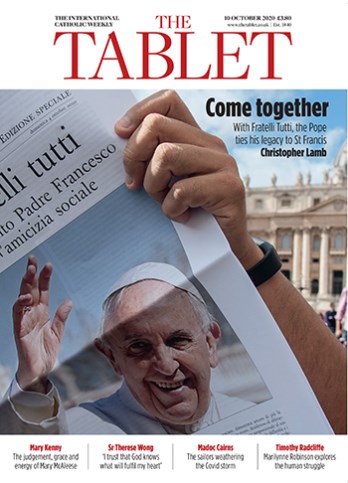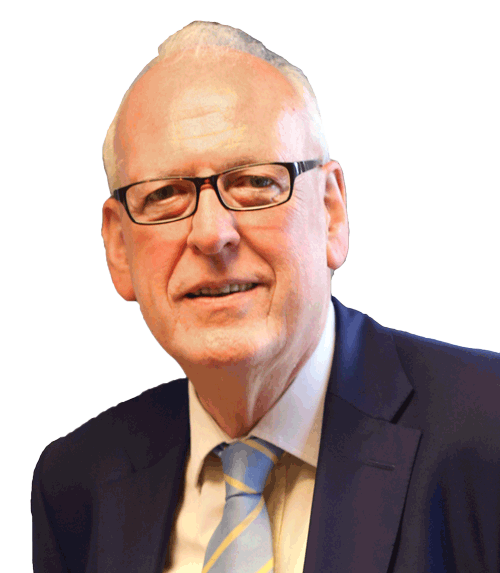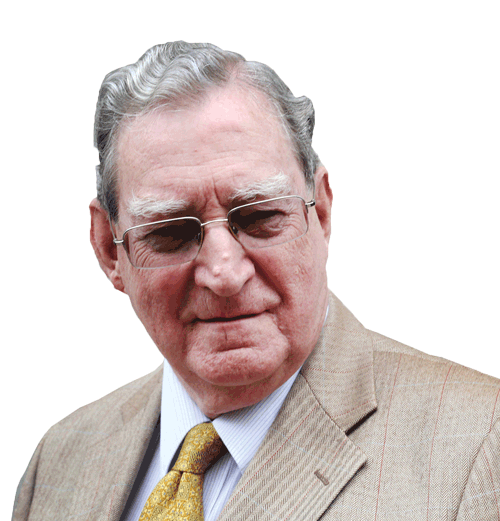Why ‘I’ must become ‘we’
What is it that modern
civilisation most lacks? What are the fundamental deficiencies that
ultimately could undermine it? Pope Francis has come up with a profound
answer that seems at first glance too insubstantial, even naive, to save
the world from itself. Not a major source of new energy or fresh food
supply; not even a cure for cancer. What the world needs is the
realisation that every member of the human race is brother or sister to
every other member, no matter how distant or unfamiliar.
In his
latest encyclical Fratelli Tutti – the phrase is from the writings of
his namesake St Francis of Assisi – the Pope closely argues an
increasingly convincing case that social division, fragmentation and the
friction they cause are the primary threats that humankind has to fear.
That includes the possibility of unprecedentedly destructive wars, but
is not limited to it. The entire environment is at risk. And the cause
is the absence of a sense that human beings all belong to the same
family, and hence to one another. “We need to think of ourselves more
and more as a single family dwelling in a common home.”
This is not some unreal utopia, however, where differences melt away in a warm wash of togetherness. Identity is local, and local loyalty matters. To use an English expression that Pope Francis is probably unfamiliar with, charity does indeed begin at home. But it ends at the ends of the Earth. Local identity is necessary and good, but is also a trap if it labels the others, those not of that tribe, as less than human. He analyses at length the parable of the Good Samaritan, and uses it to show that no one is an island but each of us is a piece of the human continent. All are neighbours to all; all are therefore covered by the injunction “love thy neighbour as thyself”.
“No one can face life in isolation … Let us dream, then, as a single human family, as fellow travellers sharing the same flesh, as children of the same Earth, which is our common home, each of us bringing the richness of his or her beliefs and convictions, each of us with his or her own voice – brothers and sisters all.”
The Pope’s choice of title was much criticised before publication of
his text. The word fratelli is a male noun and “fraternity” itself, the
word he uses to describe the encyclical’s pivotal idea, is not gender
inclusive. In the first paragraph, the Pope uses the inclusive style “he
or she”; in the second paragraph, he refers to “brothers and sisters”;
and he uses both terms throughout. But no women are cited in the
encyclical, which makes frequent use of terms like “brotherhood” to
describe the human family. Some of the negativity around the document
could have been defused with a wiser choice of title.
In the
Vatican press conference to introduce it, Professor Anna Rowlands of
Durham University aptly described the encyclical as a “devastating
challenge to our ecological, political, economic and social life”. It is
above all “a proclamation of an ineradicable, joyful truth, presented
here as a wellspring for a fatigued world”. The encyclical urges the way
of dialogue as the means by which humanity could negotiate to heal its
disagreements and divisions, and Professor Rowlands later urged dialogue
within the Catholic Church over issues such as inclusive language.
Pope
Francis underlines some of the key themes of the 2009 encyclical of
Pope Benedict XVI, Caritas in Veritate, concerning the limitations and
dangers inherent in free-market economics. And as other popes before him
have done, he emphasises the importance of the United Nations and other
world bodies. What is new is his fundamental questioning of the just
war doctrine, part of traditional Catholic teaching on warfare. “We can
no longer think of war as a solution, because its risks will probably
always be greater than its supposed benefits. In view of this, it is
very difficult nowadays to invoke the rational criteria elaborated in
earlier centuries to speak of the possibility of a just war. Never again
war!”
Every war leaves our world worse than it was before, the
Pope says. And he urges a negotiated end to nuclear deterrence as a
means to keep the peace. Francis is not unaware of the difficulties when
nations pursue their own interests rather than those of the universal
common good. Not every politician believes in “fraternity”, and
conflicts will happen. So the Pope is open to the criticism that he is
promoting an idealised view rather than a realistic one. Just war theory
was never in favour of war, but was a way of limiting its excesses. He
is right, however, that just war theory has often been dishonestly
invoked to provide a pretext for power grabs and the pursuit of partisan
interests.
Pope Francis is passionate in his defence of the rights of migrants
of all kinds, and this is probably where the encyclical will encounter
most resistance among politicians. But it follows inescapably from the
principle underpinning the document that we are all members of the same
human family. “Migrants are not seen as entitled like others to
participate in the life of society, and it is forgotten that they
possess the same intrinsic dignity as any person,” he writes. “No one
will ever openly deny that they are human beings, yet in practice, by
our decisions and the way we treat them, we show that we consider them
less worthy, less important, less human.”
There are two kinds of
moral truth – those that remain on paper, and those which enter into the
soul and change human character. Pope Francis is operating in the space
between them. On the one hand are high-sounding moral propositions,
many of which can be found in this encyclical, which nobody would really
deny but which few take on board and change course accordingly. On the
other, he is urging the world to make the immense moral effort to change
its underlying philosophy, from self-interested individualism to the
model of the interior life of a family, where in place of the words “I”
and “me”, the use of the words “we” and “us” is second nature.
In
so far as a world in which we live in solidarity and with a shared care
for the good of our neighbour is what most people yearn for, Pope
Francis can expect an attentive hearing. In so far as the world’s
leaders are really pursuing power and personal ambition rather than the
common good, then, sadly, he can expect to be ignored. But water,
dripping on even the hardest stone, will eventually wear a hole in it.
Come together
Get Instant Access
Subscribe today to take advantage of our introductory offers and enjoy 30 days' access for just £7.99
Featured Columnists











What do you think?
You can post as a subscriber user ...
User Comments (0)